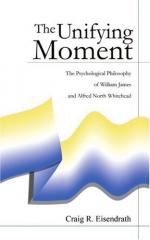|
This section contains 3,626 words (approx. 13 pages at 300 words per page) |

|
SOURCE: “Whitehead's Ethic of Feeling,” in Ethics, Vol. 81, No. 2, January, 1971, pp. 161-68.
In the following essay, Press characterizes Whitehead's metaphysics as based upon a moral philosophy of aestheticism.
I
At the root of Whitehead's metaphysics, I shall maintain, is a moral philosophy, a philosophy of the good, and this moral philosophy is an aestheticism. For it is Whitehead's belief that the metaphysical order is constituted by “‘Value’ is the name I use for the intrinsic reality of an event”1—and his evident conviction that aesthetic experience contains the dominant value of life. Thus Whitehead writes that his metaphysical doctrine “finds the foundations of the world in the aesthetic experience,” that “all order is aesthetic order,” and that “the moral order is merely certain aspects of the aesthetic order.”2 At the same time, since the “aesthetic attainment,” which is the “ultimate creative purpose,”3 is an affective attainment, Whitehead's moral...
|
This section contains 3,626 words (approx. 13 pages at 300 words per page) |

|


